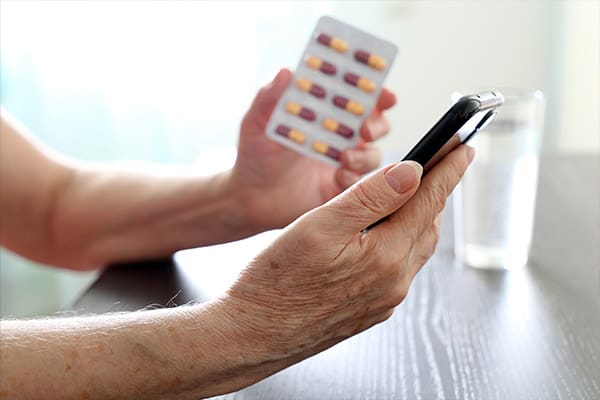
Mesothelioma patients may take medication for various reasons. It may be part of their treatment plan or to help manage treatment side effects. But what can you do if you have trouble remembering to take them?
When taking medicine, sticking to a schedule is important for mesothelioma patients. In fact, doctors advise patients to stay on schedule to help the drugs’ effectiveness and minimize side effects. Side effects may also occur with common mesothelioma treatments, including chemotherapy, immunotherapy or surgery. Between pills for treatment and side effects, it can add up to a lot of pills to remember.
To help, some companies have developed medicine tracker or medicine reminder apps for smartphones, tablets and computers. These apps track what pills you take, the dosage and if you have taken them. With so many options, how do you choose which one? Our list below covers some popular options you may consider.
Best Apps to Track Medicines
Statistics show as many as 125,000 deaths occur each year from people not taking medication as directed. Luckily, some research shows medication tracker apps may help patients follow medication guidance.
Medication tracking apps work best if you use them diligently. If you choose to use one, make sure it works for your situation. Remember, some trackers may be free while others may have a cost to purchase or subscribe.
Important Factors When Choosing a Medication Tracker
If you decide to use a medication tracker app, there are some important things to consider. Regardless of which you choose, try to find one that:
- Alerts you when you need to get a prescription refill
- Complies with the Health Insurance Portability and Accountability Act (HIPAA)
- Simplifies finding and adding prescription names and entering the dosage
Patient care teams may have apps they recommend. Patients or their loved ones may want to ask for suggestions at the next scheduled appointment.
1. Care4Today
Care4Today alerts patients when it’s time to take medication. Caregivers can set up alerts for missed doses, too. Users can also set it up to provide reminders for upcoming appointments with their doctor. With the ability to take photos of the pills, patients can quickly identify the ones they need to take. Care4Today is available for Android and iOS devices.
2. CareZone
CareZone helps track when to take doses and request refills. It can also save any contacts the patient needs to remember. Users can also have the app remind them of upcoming appointments. Mesothelioma patients and their loved ones may find these features help them feel more organized for their oncology appointments. The app includes a feature to take photos of individual pills for quick reference. Visit the CareZone website to download the app for Android and iOS devices.
3. Dosecast
Dosecast allows users to enter basic information about their medications to receive alerts. These alerts include when it’s time to take medicines and when to refill them. Dosecast is available for Amazon, Android and iOS devices.
4. EveryDose
This app helps users track their prescriptions and get medication reminders. It also offers doctors an app that can track multiple patients and ensure they continue taking their medications. EveryDose is available on the Google Play store and Apple’s App Store.
5. Medisafe
Not only can this app help track medications, but Medisafe can also track other health data. Patients can keep track of blood pressure, pulse, temperature and weight. The patient can then share that info with their doctors. The app can also let caregivers and loved ones access it to help keep track of medications. Find Medisafe Meds & Pill Reminder in the Google Play store and Apple’s App Store.
6. MyMedSchedule Plus
MyMedSchedule Plus offers more than tracking and reminders. While the app has those functions, it also explains why the patient is taking that medication. If the patient’s doctor has MyMedSchedule Pro, the doctor can update the patient’s schedule as needed. MyMedSchedule Plus is available for Android and iOS devices.
7. MyTherapy
This app tracks and reminds users to take needed medications. It also can let family members and caregivers know when the user misses a dose, allowing them to be an additional reminder. The app tracks overall health and lets users print the information to share with their doctors. MyTherapy is available on Google Play and in the App Store.
8. Cancer.Net Mobile
This free app is developed with cancer patients in mind by the American Society of Clinical Oncology. It lets patients access a complete set of tools during their cancer treatment. Users can track their medications, store questions they may want to ask their care team and track symptoms associated with their care. They can share all data collected with the app with the care team. Cancer.Net Mobile is available for Android and iOS devices.
9. RoundHealth
While this app may have fewer features than the others, some users may prefer the streamlined interface. Users can set a timeframe for when they want to receive notifications. A handy calendar feature helps keep track of missed doses. While the app does not appear to have been updated recently, RoundHealth is available for iOS devices.
Other Methods to Consider
Not everyone will feel comfortable using a medicine tracker app. It’s important to find a method that works best for you to help you stay on a routine schedule with your medications. While the various app stores have many medicine tracker options to consider, you may want to skip the smartphone route. These options take a tech-free approach to help with tracking your medicines:
- Form a routine: Take your pills when you do another activity, like when you have breakfast. Check with your doctor or the pharmacist to see if you can take the pills with food.
- Set the alarm on your watch: You may find having a simple alarm going off will remind you to take your pills. Just make sure you don’t ignore the alarm when you hear it.
- Start a medicine journal: You can use a calendar or a small pad of paper to record the date, time and medication you took. A journal can also give you a record of when you take your pills for when you see your doctor.
Patients have various methods available for keeping track of medication schedules. For many, an app might be easiest and most helpful. With many different apps to choose from, one is sure to be a good fit.




